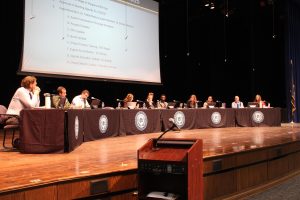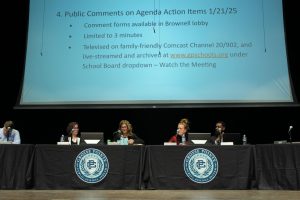Remaining true to our roots: Recognizing a history of journalism excellence, to protect the future.
October 18, 2017
It would be an understatement to say journalism has the same public integrity it did 20 years ago. This lack of trust isn’t unwarranted; in professional journalism today, articles and stories come out with angles to satisfy a specific audience and get paid based off of ratings, not objectivity. That’s why now is the time to redeem the image of this great field that was is a calling that any society needs in order to function with an educated population.
We, at The Tower, are here to say that all is not lost in terms of student media. In doing everything in our power to deliver news in a legal and professional way, our goal is not to target certain groups or have any bias. Our goal is to be a resource for the community and, overall, to restore the power of the press.
The most important way to represent ourselves is by making sure we know the laws and ethics that come with high school journalism. In the prerequisite course, students are introduced to First Amendment, court cases and resources like the Student Press Law Center which specializes in providing legal advice to high school journalists. Learning about high school journalism rights has always been a standard practice for The Tower, education correlates to success.
The previous adviser to The Tower, Rod Satterthwaite advised at South for two years. During his time working with the staff, he noted the professionalism that was started decades before under the direction of well-known advisers Bob Button and Jeff Nardone.
Satterthwaite added both Button and Nardone people who demanded excellence. Both took student journalism seriously, and the importance of student voice seriously. Without leaders like them, The Tower may not be the weekly publication it’s known and revered for.
When Nardone came into the role at South CE Sikkenga, Adviser to the Grand Haven High School Bucs’ Blade, had found someone to look up to in the student media adviser world. he added whether the story be a light feature or a controversial news package, Tower procedure was and continues to be the “Gold Standard for reporting.”
It’s fair to say that the reputation of this publication is one to upkeep, and to do so includes a healthy relationship with the school and community. We feel that it is only due respect to those who have worked almost a century to make this paper the caliber of a professional outlet.
By working with school officials, administrators and board members to give our audience a credible resource, we can reassure the community that The Tower always aims to provide fair coverage that readers want to learn about.
Betsy Rau has worked with The Tower for years, and she saw firsthand what the power of high school press can do in terms of keeping a school community well informed.
“Without student publications being strong, we aren’t training the journalists for tomorrow,” Rau said. “Your high school readers deserve the truth. You guys are the watchdogs of your school. If they get a paper that is all fluff and PR then they are not learning.”
After all, the process student media is involved with, is based in learning. To influence our work or ask to see any works in progress, would be not allowing us students to make our own decisions and get our own voices out.
“You wouldn’t go micromanage the football team, for instance, and ask the coach to see the playbook before they have their game, and you wouldn’t do that with the newspaper,” Satterthwaite said. “The learning process here is that students wrestle with content, they wrestle with design, they wrestle with how to best convey their information to their audience and you trust that they do it well.”
We cannot stress this point enough that having a thriving high school publication benefits everyone who picks up the paper and cares about the stories that must be told. And with that point, it’s important to remember that Grosse Pointe has a board policy that prevents prior review and censorship of content by any school official.
This is something Tower takes pride in and thank our School Board for implementing years ago. Section 5722 of the Board Policy states “district administrators and teachers are responsible for encouraging and ensuring freedom of expression and freedom of the press for all students, regardless of whether the ideas expressed may be considered unpopular, critical, controversial, tasteless, or offensive.”
Satterthwaite was the Legislative Chair for the Michigan Interscholastic Press Association for years and was constantly shown what can happen to schools that suffer from prior review.
“Advisers and students would call me and just tell horror stories of administrators either, taking content out, threatening students by saying things like ‘Hey if you do this story, it might affect your college applications,’ or to the adviser saying ‘We don’t have to run a newspaper class next year, you know’,” Satterthwaite said.
Stories like these are exactly why every state legislature should side with the landmark Tinker v. Des Moines Supreme Court case, which ruled that students have the first amendment rights as any citizen would as long as there isn’t disruption to the school day or learning process, granted the speech isn’t libelous or offensive. Making Michigan a ‘Tinker’ state would not allow prior review or censorship of student run publications. We encourage all readers to get behind this effort to allow more student voice in today’s world.
Readers of The Tower may question certain content we publish. This is expected, but what is not okay is for our audience to question our intentions and believe that we are uneducated about how our journalistic process works. Every story we publish is certified to bring in ethics, legality and information.















































































